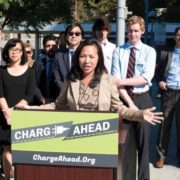Air pollution ‘chokes’ young boys and girls – Sen. De Leon
LOS ANGELES – On Thursday, November 14, a diverse coalition of community-based, public health science and conservation groups launched, a campaign that looks to put one million light, medium and heavy duty electric vehicles on California roads within the next 10 years.
In a statement, coalition representatives said that the goal is to help clean up California’s transportation system and improve the air quality in areas across the state, specifically those that are greatly exposed to a “disproportionate share of pollution.”
The coalition launched the Charge Ahead California campaign during a press conference at the Los Angeles County-USC Medical Center in East Los Angeles, an area that is considered vulnerable to high air pollution because of the freeways running through the community.
Charge Ahead California will apparently lobby for the state government to funnel current “polluter fees” on oil companies towards existing purchase incentive programs for electric vehicles. This, coalition officials say, would increase access to zero-emission vehicles in disadvantaged communities.
Michelle Kinman, clean energy advocate for the Environment California Research & Policy Center, said that Charge Ahead California was launched because pollution from cars, trucks, and buses is threatening the health of local California communities and the health of the planet.
Kinman added that they want to ensure that all Californians, especially the lower income households and communities hardest hit by air pollution, would benefit from zero tailpipe emissions. These communities include areas just like East LA, Kinman added.
According to Senator Kevin De Leon, too many children are now suffering from asthma and other respiratory diseases which can be caused and aggravated by moving emission – or harmful gasses emitted by cars, buses and trucks on the freeways.
De Leon represents the 22nd Senate district which covers a portion of East LA, particularly the area that includes the LAC-USC hospital.
During the press conference, De Leon pointed out that many kids grow up in residential neighborhoods adjacent to freeways or energy plants. As many as 7 freeways run through De Leon’s district in different directions.
“In my district, I have the 5, I have the 10, I have the 101, I have the 110, I have the 60, I have the 2 and the 134 freeways,” De Leon pointed out.
“All these freeways crisscross this area like a snake, choking out the air of the young lungs of these young boys and girls who grew up in and around this neighborhood,” De Leon added.
The senator also lamented the fact that the LAC-USC hospital’s emergency room is frequently filled with children suffering from respiratory conditions.
De Leon said that whenever a person buys a product from any of the stores in the area, the young children’s lungs “subsidize for the low price points from the goods movement” as the products were shipped in to the local stores. The shipping process, De Leon insisted, bombards the freeway-neighboring-communities with dangerous hydrocarbons and fumes that cause respiratory diseases in children.
De Leon also pointed out to the “disproportionate manner” in which the low income areas are greatly exposed to the risks of air pollution.
These observations gave the senator a reason to be excited for the campaign.
“Think about it, 1 million electrical vehicles – buses, cars – moving families from point B to point C, that is something absolutely exciting here for me,” De Leon said.
De Leon also challenged car manufacturers and called for greater access to electric vehicles. The legislator argued that being able to own to an electric or hybrid vehicle should not be determined by a person’s background, economic wherewithal, or zip code.
“We believe that everyone deserves clean air, healthy communities, and good jobs,” Greenlining Institute Director for Environmental Equity Vien Truong said.
Truong pointed out that many low income families and communities of color are bearing the overwhelming burden of air pollution from trucks, buses and vehicles.
“Forty percent of Californians are living near highways and busy roads, and that comes with a heavy price,” Truong said.
The Greenlining Institute executive explained that twice as many people die from traffic-related pollutions as compared to those who die from traffic-related accidents.
Truong said that in order to improve California’s air quality, electric vehicles must reach a critical mass across all of our communities.
She went on to enumerate various ways that the number of electric vehicles can be increased in California: car sharing and van sharing programs for electric vehicles, installing charging infrastructure in multi-family units, and making sure that there are affordable financing options for electric vehicles.
“We want to make sure that [while] we’re fueling our vehicles with electricity, we’re making jobs that boost the California economy,” she added.
Coalition officials said that as many as 100,000 additional jobs can be generated by the growth of electric vehicle and infrastructure companies as a response to the increase of electric vehicle demand.
“For all these reasons, we’re making sure that we’re supporting the growth of electric vehicles in California, cleaning up our roads, cleaning up our air, and making sure we’re creating good, green jobs,” Truong said.
“Let’s Charge Ahead, California.”






